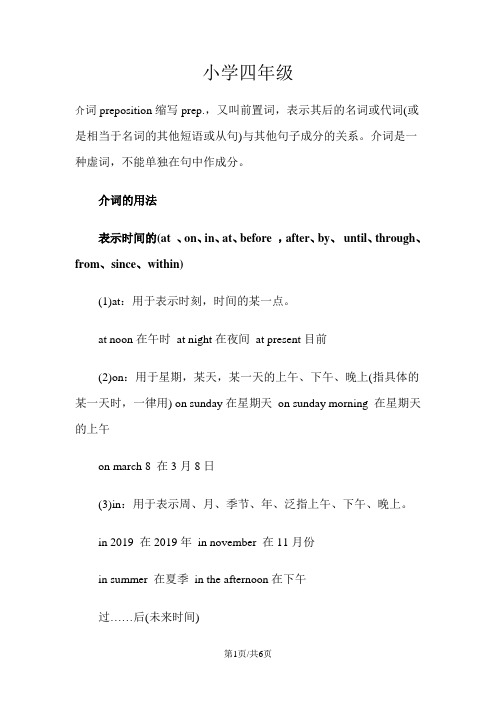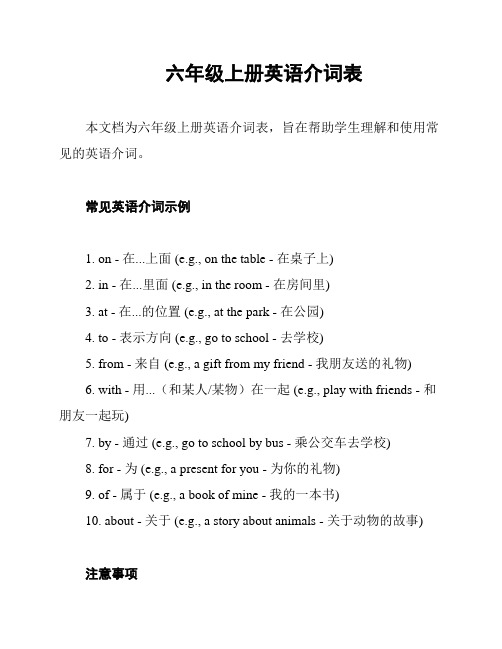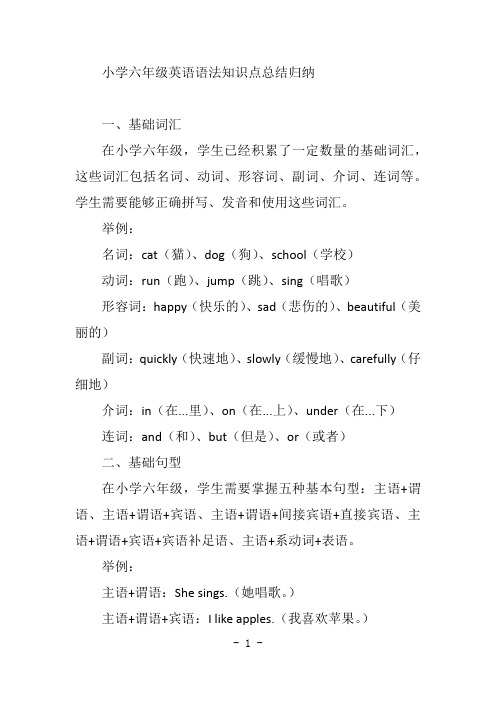小学六年级英语汇总(介词)
六年级英语时间介词练习题20题(答案解析)

六年级英语时间介词练习题20题(答案解析)1.I get up ____ six o'clock in the morning.A.atB.onC.in答案解析:A。
“at”用于具体的时刻前,“six o'clock”是具体时刻,所以用“at”。
“on”用于具体的日期、星期几等,“in”用于较长的时间段,如月份、季节、年份等。
2.We have a party ____ Christmas Day.A.atB.onC.in答案解析:B。
“on”用于具体的日期,“Christmas Day”是具体的日期,所以用“on”。
“at”用于具体的时刻,“in”用于较长的时间段。
3.My birthday is ____ May.A.atB.onC.in答案解析:C。
“in”用于月份前,“May”是月份,所以用“in”。
“at”用于具体的时刻,“on”用于具体的日期、星期几等。
4.She goes to school ____ the morning.A.atB.onC.in答案解析:C。
“in the morning/afternoon/evening”是固定搭配,表示在上午/下午/晚上。
“at”用于具体的时刻,“on”用于具体的日期、星期几等。
5.They play football ____ Sunday afternoon.A.atB.onC.in答案解析:B。
“on”用于具体的日期、星期几和有修饰语的上午、下午、晚上,“Sunday afternoon”是有修饰语的下午,所以用“on”。
“at”用于具体的时刻,“in”用于较长的时间段。
6.He finishes his homework ____ seven o'clock.A.atB.onC.in答案解析:A。
“at”用于具体的时刻,“seven o'clock”是具体时刻,所以用“at”。
“on”用于具体的日期、星期几等,“in”用于较长的时间段。
pep小学英语介词归纳

第三章介词一、定义介词preposition缩写prep.,又叫前置词,表示其后的名词或代词(或是相当于名词的其他短语或从句)与其他句子成分的关系。
介词是一种虚词,不能单独在句中作成分。
二、介词的用法1、表示时间的(at 、on、in、at、before ,after、by、until、through、from、since、within)(1)at:用于表示时刻,时间的某一点。
at noon在午时at night在夜间at present目前(2)on:用于星期,某天,某一天的上午、下午、晚上(指具体的某一天时,一律用) on sunday在星期天on sunday morning 在星期天的上午on march 8在3月8日(3)in:用于表示周、月、季节、年、泛指上午、下午、晚上。
in 1999在1999年in november 在11月份in summer 在夏季in the afternoon在下午过……后(未来时间)i think he will be back in an hour .我想他一小时后就会回来。
i heard that she would be back in a month.我听说她一个月后回来的。
(4)before:在……之前wei hua got up before 7 o’clock this morning .今天早晨,魏华在7点之前起床了。
(5)after:在……之后after that ,no noe should ever kill a seagull .从那时起,任何人不得捕杀海鸥。
(6)by:在……前(时间),截止(到)……by the time i arrived ,she had already gone .在我到达之前,她已经走了。
(7)for:达……之久(表示过了多少时间),可以和一般现在时,过去时,将来时连用,但是经常和完成时连用。
florence often worked for twenty-four hours without rest .弗洛沦斯常常工作24小时而不休息。
六年级下册英语素材小学英语介词的用法 全国通用

小学四年级介词preposition缩写prep.,又叫前置词,表示其后的名词或代词(或是相当于名词的其他短语或从句)与其他句子成分的关系。
介词是一种虚词,不能单独在句中作成分。
介词的用法表示时间的(at 、on、in、at、before ,after、by、until、through、from、since、within)(1)at:用于表示时刻,时间的某一点。
at noon在午时at night在夜间at present目前(2)on:用于星期,某天,某一天的上午、下午、晚上(指具体的某一天时,一律用) on sunday在星期天on sunday morning 在星期天的上午on march 8 在3月8日(3)in:用于表示周、月、季节、年、泛指上午、下午、晚上。
in 2019 在2019年in november 在11月份in summer 在夏季in the afternoon在下午过……后(未来时间)i think he will be back in an hour 。
我想他一小时后就会回来。
i heard that she would be back in a month.我听说她一个月后回来的。
(4)before:在……之前wei hua g ot up before 7 o’clock this morning 。
今天早晨,魏华在7点之前起床了。
(5)after:在……之后after that ,no noe should ever kill a seagull 。
从那时起,任何人不得捕杀海鸥。
(6)by:在……前(时间),截止(到)……by the time i arrived ,she had already gone 。
在我到达之前,她已经走了。
(7)for:达……之久(表示过了多少时间),可以和一般现在时,过去时,将来时连用,但是经常和完成时连用。
florence often worked for twenty-four hours without rest 。
六年级上册英语介词表

六年级上册英语介词表
本文档为六年级上册英语介词表,旨在帮助学生理解和使用常见的英语介词。
常见英语介词示例
1. on - 在...上面 (e.g., on the table - 在桌子上)
2. in - 在...里面 (e.g., in the room - 在房间里)
3. at - 在...的位置 (e.g., at the park - 在公园)
4. to - 表示方向 (e.g., go to school - 去学校)
5. from - 来自 (e.g., a gift from my friend - 我朋友送的礼物)
6. with - 用...(和某人/某物)在一起 (e.g., play with friends - 和朋友一起玩)
7. by - 通过 (e.g., go to school by bus - 乘公交车去学校)
8. for - 为 (e.g., a present for you - 为你的礼物)
9. of - 属于 (e.g., a book of mine - 我的一本书)
10. about - 关于 (e.g., a story about animals - 关于动物的故事)
注意事项
1. 本文档只列举了部分常见的英语介词及其用法。
2. 为了减少篇幅,本文档未对每个介词的所有用法进行详细解释,请根据具体语境进行使用。
参考资料
以上是六年级上册英语介词表,希望对学习英语的同学有所帮助!。
新人教版小学六年级英语下册介词表

新人教版小学六年级英语下册介词表一、关于介词的定义介词是一类虚词,用于表示人或物在时间、空间或逻辑关系上的位置、方向、时间等。
二、常用的英语介词1. in- 用于表示在某个时间段内,如in the morning(在早上)、in the afternoon(在下午)- 用于表示在某个季节,如in spring(在春季)、in summer (在夏季)- 用于表示在某个具体地点,如in the classroom(在教室)、in the park(在公园)2. on- 用于表示在某天或日期,如on Monday(在星期一)、on March 1st(在3月1日)- 用于表示在某个具体表面,如on the desk(在桌子上)、on the wall(在墙上)- 用于表示在某种交通工具上,如on the bus(在公交车上)、on the plane(在飞机上)3. at- 用于表示在某个具体时间,如at 3 o'clock(在3点钟)、at noon(在中午)- 用于表示在某个具体地点,如at school(在学校)、at the supermarket(在超市)- 用于表示在某种活动中,如at a party(在派对上)、at a concert(在音乐会上)4. into- 表示进入某个地方或状态,如go into the room(进入房间)、turn into a frog(变成一只青蛙)5. under- 表示在某物体下面或更低的位置,如under the table(在桌子下面)、under the bed(在床下)6. over- 表示在某个物体的上方,如over the bridge(在桥上)、over the clouds(在云上)7. through- 表示穿过某个地方或经过某个区域,如walk through the park (穿过公园)、drive through the tunnel(经过隧道)8. between- 表示在两个物体、位置或时间之间,如between the two trees (在两棵树之间)、between Monday and Wednesday(在星期一和星期三之间)9. among- 表示在三个或三个以上的物体、位置或时间之间,如among the flowers(在花中间)、among the students(在学生中间)10. behind- 表示在某个物体后面,如behind the door(在门后面)、behind the car(在车后面)11. in front of- 表示在某个物体前面,如in front of the house(在房子前面)、in front of the mirror(在镜子前面)12. next to- 表示在某个物体旁边,如next to the tree(在树旁边)、nextto the bookcase(在书架旁边)13. between- 表示在两个物体之间,如between the two houses(在两个房子之间)14. among- 表示在三个或三个以上的物体之间,如among the students(在学生之间)15. with- 表示伴随,如go to the park with my friend(和我的朋友一起去公园)16. without- 表示没有某物或某人,如eat lunch without vegetables(没有蔬菜的午餐)、go to the shop without money(没有钱去商店)17. for- 表示对某人或某物的利益或目的,如buy a gift for Mom(给妈妈买一份礼物)、study hard for the exam(为了考试而努力研究)三、使用介词的注意事项- 介词通常位于名词或代词之后,形成介词短语。
小学六年级英语语法知识点总结归纳

小学六年级英语语法知识点总结归纳一、基础词汇在小学六年级,学生已经积累了一定数量的基础词汇,这些词汇包括名词、动词、形容词、副词、介词、连词等。
学生需要能够正确拼写、发音和使用这些词汇。
举例:名词:cat(猫)、dog(狗)、school(学校)动词:run(跑)、jump(跳)、sing(唱歌)形容词:happy(快乐的)、sad(悲伤的)、beautiful(美丽的)副词:quickly(快速地)、slowly(缓慢地)、carefully(仔细地)介词:in(在...里)、on(在...上)、under(在...下)连词:and(和)、but(但是)、or(或者)二、基础句型在小学六年级,学生需要掌握五种基本句型:主语+谓语、主语+谓语+宾语、主语+谓语+间接宾语+直接宾语、主语+谓语+宾语+宾语补足语、主语+系动词+表语。
举例:主语+谓语:She sings.(她唱歌。
)主语+谓语+宾语:I like apples.(我喜欢苹果。
)主语+谓语+间接宾语+直接宾语:My mother gave me a book.(我妈妈给了我一本书。
)主语+谓语+宾语+宾语补足语:They elected him their monitor.(他们选他为班长。
)主语+系动词+表语:She is happy.(她很高兴。
)三、时态在小学六年级,学生需要掌握一般现在时、现在进行时、一般过去时和一般将来时这四种时态的基本用法。
举例:一般现在时:She always goes to school on time.(她总是按时上学。
)现在进行时:She is studying now.(她现在正在学习。
)一般过去时:Yesterday, we visited the zoo.(昨天,我们参观了动物园。
)一般将来时:I will go to the park tomorrow.(我明天将去公园。
)四、动词的基本形式学生需要了解动词的基本形式,包括原形、第三人称单数形式、现在分词、过去式和过去分词。
六年级英语介词推荐知识点
六年级英语介词推荐知识点在学习英语语法中,介词是一个重要的部分。
掌握了正确使用介词的方法,可以使我们的语言表达更加准确、生动。
下面是六年级英语介词的一些推荐知识点:1. 基本介词基本介词是我们在日常学习和交流中经常使用的介词,比如:in, on, at, with, to等。
它们用来表示时间、地点、方式、伴随等各种关系。
比如:- I have a meeting at 9 o'clock.- He is playing soccer with his friends.- She went to the park on Sunday.2. 双重介词双重介词是由两个介词组成的固定短语,在表达某些特定的意义时使用。
比如:out of, in front of, on top of等。
双重介词的组合一般是固定的,不能随意更改。
比如:- The cat is sitting on top of the table.- The car stopped in front of the house.3. 方位介词方位介词用来描述事物的位置和方向,常见的有:in, on, at, under, above, below等。
它们帮助我们描绘出物体在空间中的位置关系。
比如:- The book is on the desk.- The cat is under the table.4. 时间介词时间介词用来表示某一事件或行为发生的时间,常见的有:at, in, on, before, after等。
它们帮助我们描述事件发生的具体时间。
比如:- I have class at 8 o'clock.- We will go to the park on Sunday.5. 介词短语介词短语是由介词和其后面的名词或代词组成的词组,在句子中充当各种不同的语法成分,如名词的定语、状语等。
比如:- The girl with long hair is my sister.- He is good at playing basketball.6. 习惯用法在使用介词时,还需要了解一些常见的用法和习惯表达,以增加语言的准确性和地道性。
新人教(PEP)版六年级英语下册《介词》公开课ppt课件
A. in
B. with C. of
D. for
( B )4. —What’s this ____ English? —It’s an apple.
A. on B. in
C. at
D. of
( D )5. What’s the matter ______ him?
A. of B. for
C. of
D. with 12
8
(四)常见介词短语 1. 动词+介词,如: get on, get off, talk about,
get to, go to, look at
2. 形容词+介词,如: be afraid of , be good at be glad to, be kind to, be angry with
3. His football is _b_e_hi__nd___ the door, he can’t find it.
4. The girl __i_n____ blue is my sister.
5 . He usually comes to school _ _ by_ _ _ _ _ _ bus.
介词
The prep
1
目录
CONTENTS
介词的定义
介词的分类
常见介词用法辨析 常见介词短语
2
(一)介词的定义
介词常置于名次或代词的前面,表
示该词与其他成分的关系,一般在句子 中不单独做任何句子成分。
如: There is a kite in the sky. Mary is like her mother.
Thank you for staying in our hotel. What about going hiking?
小学六年级英语介词知识点及练习题
【导语】学习英语可以让我们更好地认识汉语。
这句话听上去似乎有点⽭盾,但学习⼀门外语确实能够增加我们对母语的理解。
这是因此在学习外语的过程中我们会不断将其与母语⽐较,从⽽能够以⼀个新的⾓度来审视⾃⼰的母语。
以下是整理的《⼩学六年级英语介词知识点及练习题》相关资料,希望帮助到您。
【篇⼀】⼩学六年级英语介词知识点 ①in+⽉、年 the morning/afternoon/evening/a week 表⽰时间 ②on+具体某⼀天(⼏⽉⼏⽇)/某个假期(…Day) ③at+具体某点时间、某个假期(…Festival)/the weekend ①in…street 表⽰⽅位 ②on…road/left/right ③at the…crossing/stop/某个具体的地点 ①in the tree(不是树上长出来的) ②on the tree(树上原来⾃⼰长出来的) 表⽰时间: ① ago(……以前) later(……以后) ② before (在……以前) after(在 ……以后) be 动词和助动词 1、 be 动词(am/is/are) 主语 be 动词(原形) be 动词(过去式) I am was He/she/it is was We/you/they are were 2、助动词(do/does/did) Do+⾮第三⼈称单数 +动词原形…? …do/don't Does+第三⼈称单数 …does/doesn't Did+所有主格 …did/didn't What do you/they/we… +动词原形? I/They/We+动词原形… What does he/she/it… He/She/It +(动词+S)…. What did you/they/we/ he/she/it… I/They/We/ He/She/It +动词过去式。
【篇⼆】⼩学六年级英语介词练习题1 ( ) 1. Why did you get up so early ___ this morning.A. onB. /C. atD. in ( ) 2. He went to Shanghai___ September 3, 1991 and came back___ a cold morning last year.A. in; onB. on; inC. on; onD. in; ia ( ) 3. Lucy was born____ the night of May 12, 1984.A. onB. inC. atD. to ( ) 4. Mrs Brown came to China ____ 1996.A.onB. ofC. toD. in ( ) 5 ___ the morning of November 20, 1915, the workers came to Chicago to show their mourning of Joe Hill.A. OnB. InC. OnD. At ( ) 6. Ann moved___Hangzhou___September, 1992.A. /; inB. to; inC. to; on D, in; in ( ) 7. They started off___an autumn afternoon.A. duringB. atC. inD. on ( ) 8. He often goes ____ school ____ six thirty ____ the morning.A. for; to; inB. to; at; inC. to; for; at D, for; at; to ( ) 9. He arrived ___ Shanghai ___ 9: 30 ___ March 5.A. at; in; atB. to; on; atC. in; on; atD. in; at; on ( ) 10.The English teacher told me to get there____ half past ten.A. inB. atC. onD. of 参考答案: B C A D B A D B D B【篇三】⼩学六年级英语介词练习题2 ( ) 1. Children get gifts ____ Christmas and ____ their birthdays.A. on; onB. at; onC. in; inD. in; on ( ) 2.----There is nothing ____tomorrow afternoon, is there? -----No. We can have a game of table tennis.A. onB. inC. outD. up ( ) 3. A lot of students in our school were born____March, 1981.A. inB. atC. onD. since ( ) 4. He suddenly returned____ a rainy night.A. onB. atC. inD. during ( ) 5. My grandfather was born____Oct. 10, 1935.A. onB. inC. atD. of ( ) 6. The train is starting___five minutes.A. inB. atC. forD.still ( ) 7. Mike does his exercises ____ seven _____ the evening.A. on; toB. at; inC. by; ofD. at; on ( ) 8. Children wake up very early____the morning of Christmas Day.A. inB. onC. forD. at ( ) 9 ____ a cold winter morning, I met her in the stfeet.A. InB. OnC. AtD. For ( ) 10 It happened to be very cold____ the morning of our sports meeting.A. atB. onC. withD. of 参考答案:B A A A A A B B B B。
六年级英语常用介词用法指南
六年级英语常用介词用法指南介词在英语中起着连接词与词之间关系的作用,对于学习英语的六年级学生来说,熟练掌握常用介词的用法非常重要。
本指南将详细介绍六年级英语常用介词的用法,并提供相关例句,帮助学生加深对介词的理解。
一、关于地点1. in:表示在某个地点或范围内- The cat is in the box.- My school is in the center of town.2. on:表示在某个平面或表面上- The book is on the table.- Don't put your feet on the chair.3. at:表示在某个具体地点或场所- I saw Jim at the supermarket yesterday.- Let's meet at the park tomorrow.4. under:表示在某物体下方- The cat is sleeping under the bed.- The ball rolled under the couch.二、关于时间1. at:表示具体的时间点- The movie starts at 7 o'clock.- I have a doctor's appointment at 2 p.m.2. on:表示某一天或日期- We celebrate Christmas on December 25th.- I always visit my grandparents on Sundays.3. in:表示在某一段时间内- She will come back in an hour.- We usually have winter break in December.三、表示原因1. because of:因为- She couldn't come because of the heavy rain.- He was late for school because of the traffic.2. due to:由于- The game was canceled due to the bad weather. - The flight was delayed due to technical problems.四、关于方向和运动1. to:表示朝着某个地方或目标的方向- I walked to the park with my friends.- She gave a present to her teacher.2. into:表示进入某个地方或物体内部- The dog jumped into the river.- She put the books into her bag.3. out of:表示从某个地方或物体内部离开- The cat ran out of the house.- Take the cookies out of the oven.五、其他常用介词1. with:表示伴随或使用某事物- I went to the park with my brother.- He writes with a pen.2. for:表示做某事的目的- She bought a gift for her friend's birthday. - He is studying hard for the upcoming exam.3. by:表示通过某种方式或工具- I go to school by bus.- She learned English by watching movies.4. about:关于- We had a discussion about the new book.- The teacher taught us about the solar system.以上就是六年级英语常用介词用法的指南,希望能对学生们的学习有所帮助。
